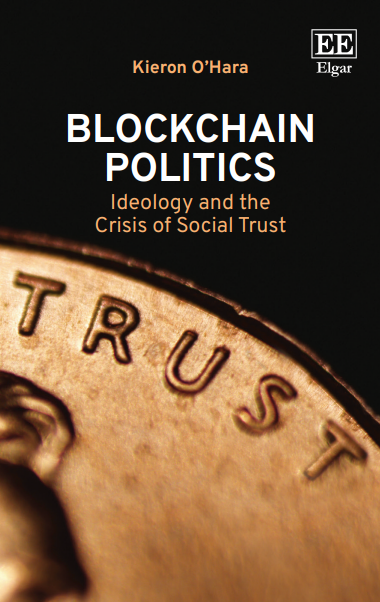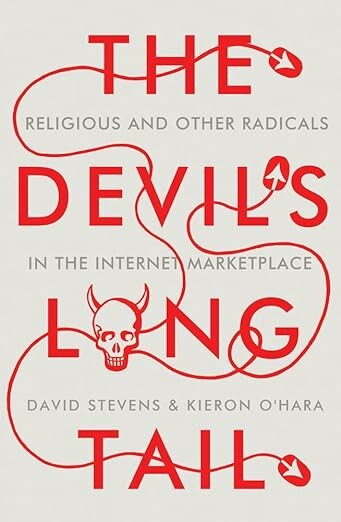Society
 Books relating to Society
Books relating to Society
Blockchain Politics

Likening contemporary extremes of far-right populism and identity politics to 17th century Peasants and Puritans, Blockchain Politics examines the enduring importance of trust in political life. Kieron O’Hara develops a new theory of trust to analyse how these extremes undermine social accord and weaken representative democracy, and to suggest remedies.
Huxley

Author of Brave New World and The Doors of Perception, and inventor of the term ‘psychedelic’, Aldous Huxley was a global trend-setter ahead of his time. In this study Dr Kieron O’Hara explores the life of this great visionary, charting his transformation from society satirist to Californian guru-mystic through an insightful analysis of his life’s work. Combining thoughtful biography, easy-to-use reading notes, and an insightful exploration of Huxley’s continuing legacy, Huxley: A Beginner’s Guide is the definitive introduction to one of the twentieth century’s most influential thinkers.
The Enlightenment

Blamed for the bloody disasters of the 20th century: Auschwitz, the Gulags, globalisation, Islamic terrorism; heralded as the harbinger of reason, equality, and the end of arbitrary rule, the Enlightenment has been nothing if not divisive. To this day historians disagree over when it was, where it was, and what it was (and sometimes, still is). Kieron O’Hara deftly traverses these conflicts, presenting the history, politics, science, religion, arts, and social life of the Enlightenment not as a simple set of easily enumerated ideas, but an evolving conglomerate that spawned a very diverse set of thinkers, from the radical Rousseau to the conservative Burke.
Joseph Conrad Today

This book argues that the novelist Joseph Conrad’s work speaks directly to us in a way that none of his contemporaries can. Conrad’s scepticism, pessimism, emphasis on the importance and fragility of community, and the difficulties of escaping our history are important tools for understanding the political world in which we live. He is prepared to face a future where progress is not inevitable, where actions have unintended consequences, and where we cannot know the contexts in which we act.
The Devil’s Long Tail

In The Devil’s Long Tail, Stevens and O’Hara argue that we misunderstand online extremism if we think intervention is the best way to counter it. Policies designed to disrupt radical networks fail because they ignore the factors that push people to the margins. Extremists are driven less by ideas than by the benefits of participating in a tightly-knit, self-defined, group. Rather, extreme ideas should be left to sink or swim in the internet’s marketplace of ideas.
Life and the Law in the Era of Data-Driven Agency

This ground-breaking and timely book explores how big data, artificial intelligence and algorithms are creating new types of agency, and the impact that this is having on our lives and the rule of law. Addressing the issues in a thoughtful, cross-disciplinary manner, leading scholars in law, philosophy, computer science and politics examine the ways in which data-driven agency is transforming democratic practices and the meaning of individual choice.
Plato and the Internet

We live in a knowledge economy. Competition now straddles the world, and competitive advantage will be produced from now on by knowledge and creativity. Acquiring and managing knowledge better has become a political imperative. And yet – what is knowledge? Plato and the Internet argues that what is important is not ‘what facts you know’, but ‘what you know how to do’, and that the essential contrast is not between knowledge and belief, but between knowledge and information. Is the Internet really something new – or a continuation of the past by other means?
The Theory and Practice of Social Machines

Social machines are a type of network connected by interactive digital devices made possible by the ubiquitous adoption of technologies such as the Internet, the smartphone, social media and the read/write World Wide Web, connecting people at scale to document situations, cooperate on tasks, exchange information, or even simply to play. Existing social processes may be scaled up, and new social processes enabled, to solve problems, augment reality, create new sources of value, and disrupt existing practice.
 Articles relating to Society
Articles relating to Society
Blockchain Politics: Abstract and Analytic Table of Contents
2026
Themes: Conservatism, Extremism, Trust
Category: Extended abstract, Open access
Privacy and digital modernity: liberal and conservative approaches to technology, personalisation and the individual
Martin Beckstein & David McGrogan (eds.), The Conservative Critique of Liberalism, 89-124
2026
Themes: Conservatism, Digital modernity, Privacy
Category: Book chapter, Peer reviewed
Read the articleZuckerberg’s cave: smartness and discipline in digital modernity
Dariusz Brzezinsky, Kamil Filipek, Kuba Piwowar & Malgorzata Winiarska-Brodowska (eds.), Algorithms, Artificial Intelligence and Beyond: Theorizing Society and Culture of the 21st Century, 72-88
2024
Themes: Artificial Intelligence (AI), Digital modernity
Category: Book chapter, Peer reviewed
This chapter discusses some of the narratives or imaginaries that help structure our experience of, and the development of, the technological suite that mediates the affordances of social life in wealthy Western societies (and increasingly in less wealthy ones, and elsewhere than the West) in the 2020s. It argues that, far from society having transcended modernity to become postmodern, modernity has evolved, from the ‘high’ or ‘reflexive’ modernity of the late 20th century to a characteristic digital modernity. The chapter draws out some of its consequences, sketching its four institutional dimensions. Its disciplinary stance towards individuals gives rise to a myth which is termed Zuckerberg’s Cave, which is compared to the pre-modern cave of Plato, as well as analogous myths of modernity. The realistic prospects of digital modernity are assessed, setting out both its practical risks and its attractions to citizens and policymakers alike.
Read the articlePersonalisation and digital modernity: deconstructing the myths of the subjunctive world
Utal Kohl & Jacob Eisler (eds.), Data-Driven Personalisation in Markets, Politics and Law, 37-54
2021
Themes: Computing/The Internet, Digital modernity
Category: Book chapter, Open access, Peer reviewed
In this chapter, I discuss the role of personalisation in a wider narrative of the development of democratic societies, in terms of digital modernity, driven by a vision of data-driven innovation over networked structures facilitating socio-environmental control. This chapter deals with narratives of how modernity plays out and is implemented by institutions and technologies, which are inevitably partial, and selective in what they foreground and ignore. It begins with a discussion of digital modernity, showing how data-driven personalisation is central to it, and how privacy not only loses its traditional role as a support for individuality, but becomes a blocker for the technologies that will realise the digitally modern vision. The chapter develops the concept of the subjunctive world, in which individuals’ choices are replaced by what they would have chosen if only they had sufficient data and insight. Furthermore, the notions of what is harmful for the individual, and the remedies that can be applied to these, become detached from the individual’s lived experience, and reconnected, in the policy space, to the behaviour and evolution of models of the individual and his or her environment.
Read the article Download the articleBig data, consequentialism and privacy
Kevin Macnish & Jai Galliott (eds.), Big Data and Democracy, 13-26
2020
Themes: Digital modernity
Category: Book chapter, Peer reviewed
This chapter applies a Weberian analysis to developments in big data. O’Hara argues that just as Weber noted a move from the pre-modern to the modern with the advent of bureaucracy, so we are now entering a time of digital modernity. The focus in digital modernity is less the present (what is happening now) as the subjunctive (what could happen), governed by data. This, he argues, gives data a central role in governing for both good and ill.
Read the articleData-driven government: the triumph of Thatcherism or the revenge of society?
Antony Mullen, Stephen Farrall & David Jeffery (eds), Thatcherism in the 21st Century: The Social and Cultural Legacy, 55-73
2020
Themes: Conservatism, Digital modernity
Category: Book chapter, Peer reviewed
Margaret Thatcher’s statement that ‘there is no such thing as society’ has overshadowed Conservative Party politics since the 1980s, and has been the subject of exegesis and attempts at repudiation ever since. This chapter considers the statement in the context of Angus Maude’s critique of ‘society’ as a statistical abstraction, which comes, erroneously, to be taken as an agent in its own right, able to take on the responsibilities of individuals to their communities and ‘little platoons’, and ultimately to become the end of policy itself. This digital modernity, nascent in Maude’s and Thatcher’s day, is becoming increasingly influential, thanks to data-based policy and data-driven agency. The chapter argues that Maude’s subtler analysis still yields a conservative critique of digital modernity, whereas the less nuanced neoliberal individualism valorised by Thatcher may be seen as one of its enablers.
Read the articleBetween the editors
Mireille Hildebrandt & Kieron O'Hara (eds.), Life and the Law in the Era of Data-Driven Agency, 16-43
2020
Co-authors: Mireille Hildebrandt,
Category: Book chapter, Open access
This chapter contains a crossing of swords and thoughts between the editors, who come from different disciplinary backgrounds and different philosophical traditions, but nevertheless occupy much common ground. The conversation is too short to enable the cutting edge of Occam’s razor, but refers to other work with more extensive argumentation. We agree on a great deal. In particular, we share a precautionary approach that requires proactive consideration of how one’s experimental business models or progressive politics may impact others. However, as the reader will see, at that point we part company! The ensuing dialogue has been illuminating for us, and hopefully will whet the reader’s appetite for the excellent chapters that follow in our edited book Life and the Law in the Era of Data-Driven Agency.
Read the article Download the articlePreface
Mireille Hildebrandt & Kieron O'Hara (eds.), Life and the Law in the Era of Data-Driven Agency, xii-xiv
2020
Co-authors: Mireille Hildebrandt
Category: Book chapter, Open access
Preface to the volume Life and the Law in the Era of Data-Driven Agency, edited by Mireille Hildebrandt and Kieron O’Hara.
Read the article Download the articleIntroduction: Life and the law in the era of data-driven agency
Mireille Hildebrandt & Kieron O'Hara (eds.), Life and the Law in the Era of Data-Driven Agency, 1-15
2020
Co-authors: Mireille Hildebrandt
Category: Book chapter, Open access
This chapter introduces the core topics of the volume Life and the Law in the Era of Data-Driven Agency, providing a hopefully appetizing overview of the chapters and their interrelations.
Read the article Download the articleThe conservative reaction to data-driven agency
Mireille Hildebrandt & Kieron O'Hara (eds.), Life and the Law in the Era of Data-Driven Agency, 175-193
2020
Co-authors: Mark Garnett
Themes: Conservatism, Digital modernity
Category: Book chapter, Peer reviewed
Political issues pertaining to data-driven agency and the use of ‘big data’ to make decisions about people’s lives are usually seen through the lens of liberalism. A conservative examination of data-driven agency requires a different lens. This chapter adopts the perspective of evolving modernity. It considers the philosophy of three major conservative thinkers, Edmund Burke, Alexis de Tocqueville and Michael Oakeshott, in the context of the problematisation of big data contained in Mireille Hildebrandt’s Smart Technologies and the End(s) of Law. Present-day conservatives need to rethink their traditional antipathy to the state, reverting to a Burkean understanding of the public-private distinction, and also to revise views of individual agency in the face of the facilitation of collective agency by networked digital technology.
Read the articleWhy should I? Cybersecurity, the security of the state and the insecurity of the citizen
Politics and Governance, 6(2), 41-48
2018
Co-authors: Lizzie Coles-Kemp, Debi Ashenden
Themes: Cybersecurity, Society
Category: Journal article, Open access, Peer reviewed
Assumptions are made by government and technology providers about the power relationships that shape the use of technological security controls and the norms under which technology usage occurs. We present a case study carried out in the North East of England that examined how a community might work together using a digital information sharing platform to respond to the pressures of welfare policy change. We describe an inductive consideration of this highly local case study before reviewing it in the light of broader security theory. By taking this approach we problematise the tendency of the state to focus on the security of technology at the expense of the security of the citizen. From insights gained from the case study and the subsequent literature review, we conclude that there are three main absences not addressed by the current designs of cybersecurity architectures. These are absences of: consensus as to whose security is being addressed, evidence of equivalence between the mechanisms that control behaviour, and two-way legibility. We argue that by addressing these absences the foundations of trust and collaboration can be built which are necessary for effective cybersecurity. Our consideration of the case study within the context of sovereignty indicates that the design of the cybersecurity architecture and its concomitant service design has a significant bearing on the social contract between citizen and state. By taking this novel perspective new directions emerge for the understanding of the effectiveness of cybersecurity technologies.
Read the article Download the articlePity the poor engineer: review of Ragnedda & Muschert, Theorizing Digital Divides, and Ekbia & Nardi, Heteromation
European Journal of Communication, 33(3), 338-343
2018
Themes: Computing/The Internet, Digital modernity
Category: Book review, Open access
Review of two books, different in tone and intended audience, pour cold water on the optimism of the engineering project of using digital technologies to enable networks to develop and flourish at scale. Theorizing Digital Divides punctures the positive narrative of inclusion, while Heteromation problematises the whole idea.
Read the article Download the articleThe contradictions of digital modernity
AI & Society, 35(1), 197-208
2018
Themes: Computing/The Internet, Digital modernity
Category: Journal article, Open access, Peer reviewed
This paper explores the concept of digital modernity, the extension of narratives of modernity with the special affordances of digital networked technology. Digital modernity produces a new narrative which can be taken in many ways: to be descriptive of reality; a teleological account of an inexorable process; or a normative account of an ideal sociotechnical state. However, it is understood that narratives of digital modernity help shape reality via commercial and political decision-makers, and examples are given from the politics and society of the United Kingdom. The paper argues that digital modernity has two dimensions, of progression through time and progression through space, and these two dimensions can be in contradiction. Contradictions can also be found between ideas of digital modernity and modernity itself, and also between digital modernity and some of the basic pre-modern concepts that underlie the whole technology industry. Therefore, digital modernity may not be a sustainable goal for technology development.
Read the article Download the articleSocial machines as an approach to group privacy
Linnet Taylor, Luciano Floridi & Bart van der Sloot (eds.), Group Privacy: New Challenges of Data Technologies, 101-122
2016
Co-authors: Dave Robertson
Themes: Privacy, Social machines
Category: Book chapter, Peer reviewed
This chapter introduces the notion of social machines as a way of conceptualising and formalising the interactions between people and private networked technology for problem-solving. It is argued that formalisation of such ‘social computing’ will generate requirements for information flow within social machines and across their boundaries with the outside world. These requirements provide the basis for a notion of group privacy that is neither derivative from the idea of individual privacy preferences, nor founded in political or moral argument, but instead related to the integrity of the social machine and its capabilities for bottom-up problem-solving. This notion of group privacy depends on a particular technological setup, and is not intended to be a general definition, but it has purchase in the context of pervasive technology and big data which has made the question of group privacy pressing and timely.
Read the articleData, legibility, creativity … and power
IEEE Internet Computing, 19(2), 88-91
2015
Themes: Digital modernity
Category: Journal article, Open access, The Digital Citizen
In a world where data crunching has the potential to crunch out the individual, how can people respond? Kieron O’Hara discusses the dangers and downfalls of conflating people with data, without a balance in feedback between algorithms and individuals.
Read the article Download the articleIn worship of an echo
IEEE Internet Computing, 18(4), 79-83
2014
Themes: Extremism
Category: Journal article, Open access, The Digital Citizen
This column critically examines the hypothesis that the Internet is responsible for creating echo chambers, in which groups can seal themselves off from heterodox opinion, via filtering and recommendation technology. Echo chambers are held responsible by many for political polarization, and the growth of extremism, yet the evidence doesn’t seem to support this view. Echo chambers certainly exist, and can be detrimental to deliberation and discussion, but equally have a role to play in group formation, solidarity, and identity. The case for intervening in Internet governance to suppress echo chambers is not proven.
Read the article Download the articleThe information spring
IEEE Internet Computing, 18(2), 79-83
2014
Themes: Transparency/open data
Category: Journal article, Open access, The Digital Citizen
The great sociologist Max Weber conceived government as a sort of giant information processor. Yet despite great strides and many successes in e-government and the application of IT to government, semantically enabled public administration has still not established itself. This column argues that there is still room for optimism, because open data and semantic technologies could revolutionize not just governments’ information processing practices, but the purpose and scope of government itself. We have to come to terms with not only the machinery of administration, but also the wider question of the relationship between citizens and Leviathan. This is obviously not merely a technical question. Liberation is a theme in modern politics, from the Prague Spring to the Arab Spring. We are seeing the emergence of an Information Spring, which could set data and information free to serve the people — if we understand its implications in the right way.
Read the article Download the articleThe technology of collective memory and the normativity of truth
Diane P Michelfelder, Natasha McCarthy & David E. Goldberg (eds.), Philosophy and Engineering: Reflections on Practice, Principles and Process, 279-290
2013
Themes: Memory
Category: Book chapter, Peer reviewed
Neither our evolutionary past, nor our pre-literate culture, has prepared humanity for the use of technology to provide records of the past, records which in many contexts become normative for memory. The demand that memory be true, rather than useful or pleasurable, has changed our social and psychological self-understanding. The current vogue for lifelogging, and the rapid proliferation of digital memory-supporting technologies, may accelerate this change, and create dilemmas for policymakers, designers and social thinkers.
Read the articleLinked data in government
IEEE Internet Computing, 17(4), 72-77
2013
Co-authors: Nigel Shadbolt
Themes: Semantic Web/linked data, Transparency/open data
Category: Journal article, Peer reviewed
Government data is powerful, plentiful, and relevant to citizens’ concerns. Making it open supports transparency, crowdsourcing data enhancement, and innovative service development. The authors review the state of linked open government data, in the context of the potential for the publishing organizations and the Linked Data Web itself, as well as the administrative and political issues raised.
Download the articleSocial machine politics are here to stay
IEEE Internet Computing, 17(2), 87-90
2013
Themes: Politics, Social machines
Category: Journal article, The Digital Citizen
The US has always been ahead of the curve in digital politics. Its mega-campaigns collect and spend absurd quantities of cash, they last forever, and they’re run by the candidates, not the parties. Obama’s campaign was Obama’s, not the Democratic Party’s. The US provides space for entrepreneurialism and experimentation, not least in the use of technology. Other nations will follow its lead. And the stories were microblogging, social networks, and big data.
Read the articleLinked open government data: lessons from data.gov.uk
IEEE Intelligent Systems, 27(3), 16-24
2012
Co-authors: Nigel Shadbolt, Tim Berners-Lee, Nicholas Gibbins, Hugh Glaser, Wendy Hall, mc schraefel
Themes: Semantic Web/linked data, Society, Transparency/open data
Category: Journal article, Peer reviewed
A project to extract value from open government data contributes to the population of the linked data Web with high-value data of good provenance.
Read the articleNarcissus to a man: lifelogging, technology and the normativity of truth
Talk given at the Second Annual Microsoft SenseCam Symposium, Dublin
2010
Themes: Memory
Category: Talk
The growth of the practice of lifelogging, exploiting the capabilities provided by the exponential increase in computer storage, and using technologies such as SenseCam as well as location-based services, Web 2.0, social networking and photo-sharing sites, has led to a growing sense of unease, articulated in books such as Mayer-Schönberger’s Delete, that the semi-permanent storage of memories could lead to problematic social consequences. This talk examines the arguments against lifelogging and storage, and argues that they seem less worrying when placed in the context of a wider debate about the nature of mind and memory and their relationship to our environment and the technology we use.
Read the article Download the articleLifelogging: privacy and empowerment with memories for life
Identity in the Information Society, 1(2), 155-172
2009
Co-authors: Mischa M. Tuffield, Nigel Shadbolt
Themes: Memory
Category: Journal article, Open access, Peer reviewed
The growth of information acquisition, storage and retrieval capacity has led to the development of the practice of lifelogging, the undiscriminating collection of information concerning one’s life and behaviour. There are potential problems in this practice, but equally it could be empowering for the individual, and provide a new locus for the construction of an online identity. In this paper we look at the technological possibilities and constraints for lifelogging tools, and set out some of the most important privacy, identity and empowerment-related issues. We argue that some of the privacy concerns are overblown, and that much research and commentary on lifelogging has made the unrealistic assumption that the information gathered is for private use, whereas, in a more socially-networked online world, much of it will have public functions and will be voluntarily released into the public domain.
Read the article Download the articleMemories for life: a review of the science and technology
Journal of the Royal Society Interface, 3(8), 351-365
2006
Co-authors: Richard Morris, Nigel Shadbolt, Graham J. Hitch, Wendy Hall, Neil Beagrie
Themes: Memory
Category: Journal article, Open access, Peer reviewed
This paper discusses scientific, social and technological aspects of memory. Recent developments in our understanding of memory processes and mechanisms, and their digital implementation, have placed the encoding, storage, management and retrieval of information at the forefront of several fields of research. At the same time, the divisions between the biological, physical and the digital worlds seem to be dissolving. Hence, opportunities for interdisciplinary research into memory are being created, between the life sciences, social sciences and physical sciences. Such research may benefit from immediate application into information management technology as a testbed. The paper describes one initiative, memories for life, as a potential common problem space for the various interested disciplines.
Read the article Download the article Talks relating to Society
Talks relating to Society
5 AIMS: Ideology and Divergent Interpretations of Trustworthy AI
SPRITE+ Lunch and Learn talk
March 19th, 2025
Themes: Artificial Intelligence (AI), Digital modernity, Politics, Trust
Category: Invited talk
WatchInsta-Worthy Memories and Filtered Truth
Royal Institute of Philosophy London Lecture Series 2024-25: Remembering and Forgetting
January 23rd, 2025
Themes: Computing/The Internet, Digital modernity, Memory
Category: Invited talk
WatchThe Enlightenment – Audiobook Preview
February 19th, 2024
Themes: The Enlightenment
Category: Promotional video
ListenData-driven personalisation and markets, politics and law
Interview with Jacob Eisler
August 5th, 2021
Themes: Digital modernity
Category: Interview
WatchWhat are Social Machines?
8th ESRC Research Methods Festival, Bath
July 4th, 2018
Themes: Computing/The Internet, Society
Category: Invited talk
Watch Kieron O'Hara
Kieron O'Hara